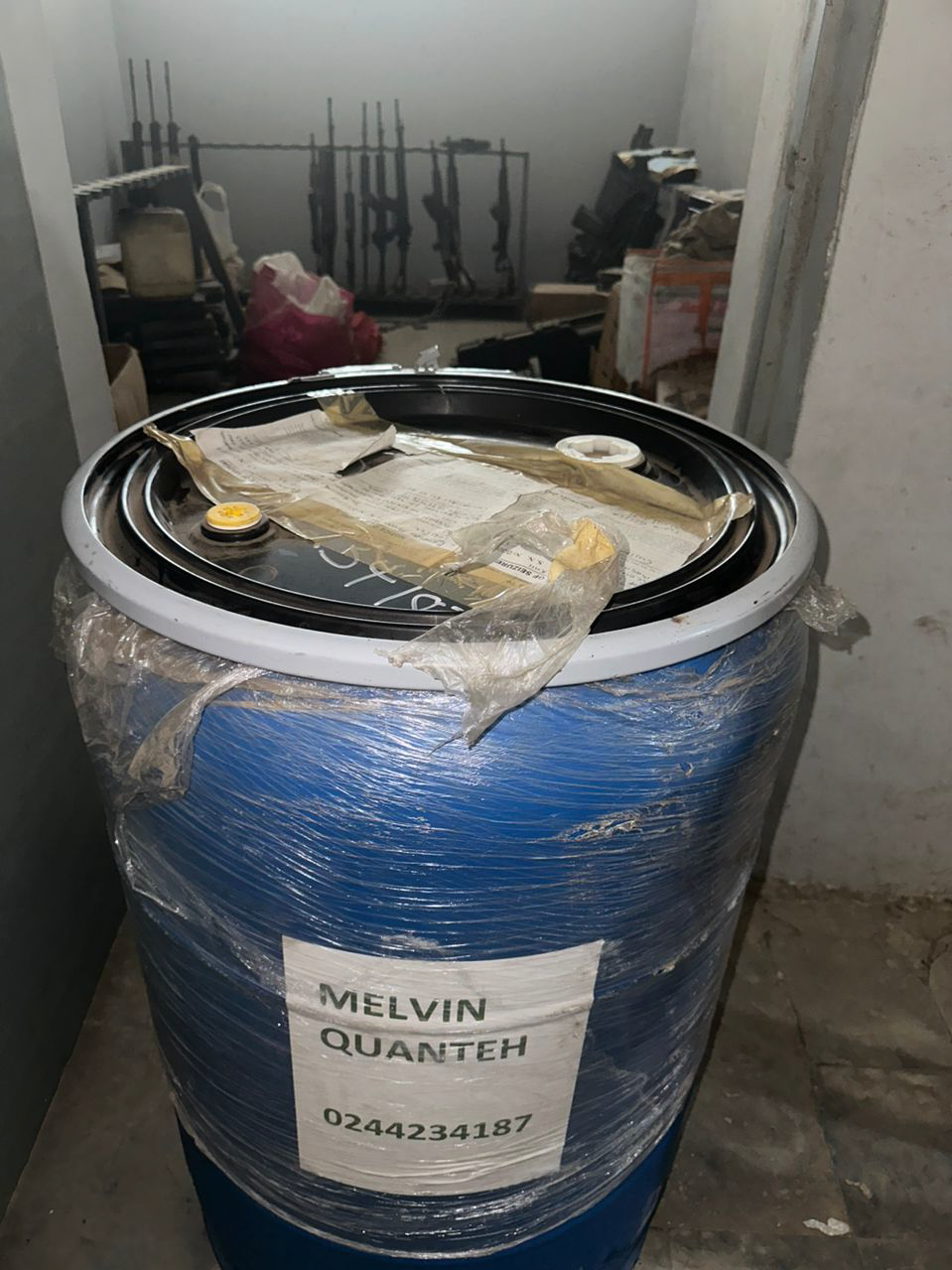
A Senior Lecturer/Financial Economist, Banking and Finance Department at the University of Professional Studies, Accra (UPSA), Dr. Eric Boachie Yiadom, has stated that the mining sector of Ghana’s economy, particularly gold, has faced significant revenue leakages.
He says that gold exports have been a major source of foreign exchange for Ghana, but underreporting of gold production and smuggling have deprived the country of much-needed revenue.
In addition, he said, “the lack of effective monitoring systems has enabled the diversion of gold exports, with limited checks on the actual amount produced and exported.”
In an article titled Closing the gap: How technology is curbing tax revenue leakages in Ghana, Dr Dr. Eric Boachie Yiadom said “SML’s Role in the Mining Sector: Although SML’s primary focus has been the petroleum sector, the company’s model of real-time monitoring and automated tracking could be applied to the mining sector.
“Just as SML monitors the volume of petroleum products lifted, similar systems could be adopted for tracking the production and export of gold, ensuring that all mined resources are accurately reported and taxed. Furthermore, integrating blockchain technology for tracking the flow of minerals could provide a tamper-proof system, increasing transparency and reducing the scope for fraudulent activities.”
In the petroleum sector, he said that the sector has long been a major contributor to tax revenue in Ghana, but it has also been one of the most vulnerable to revenue leakages.
Historically, he said, discrepancies between the reported volumes of fuel lifted by the National Petroleum Authority (NPA) and the taxable volumes recorded by the Ghana Revenue Authority (GRA) have led to significant revenue losses.
Between 2019 and 2020, for instance, a report revealed that the data gap between NPA and GRA volumes reached 3.2 billion litres, representing an estimated loss of GH?4.6 billion in revenue. This gap was primarily attributed to underreporting, fuel diversion, and the absence of real-time tracking mechanisms.
“To address this, SML introduced the Electronic Metering Management System (EMMS), which has played a pivotal role in reducing discrepancies. The system enables real-time tracking of fuel receipts, distributions, and sales at the depots, ensuring accurate volume reporting and reducing underreporting. Since its implementation, over 14.1 billion litres of petroleum products have been tracked, generating an additional GH?20.3 billion in tax revenue. By automating the reconciliation of fuel volumes and integrating data from the NPA, GRA, and Customs, SML has been able to significantly narrow the data gap, increasing transparency and compliance in the petroleum sector,” he said.
Below is his full article…
Closing the gap: How technology is curbing tax revenue leakages in Ghana
Tax revenue leakages have been a longstanding issue for Ghana, affecting the government’s ability to mobilize the resources needed to fund essential public services and development initiatives. Leakages occur in several critical sectors, including the petroleum, gold, customs, and port operations, where underreporting, evasion, and weak monitoring systems have historically resulted in significant revenue losses.
To address these challenges, the government has launched initiatives such as the Revenue Assurance and Compliance Enforcement (RACE) program, which aims to leverage technological advancements to close these gaps and enhance revenue mobilization. The role of Strategic Mobilization Limited (SML) has been particularly pivotal in improving tax compliance through advanced technologies.
This article explores the current state of tax revenue leakages in Ghana, particularly within the petroleum and mining sectors, and examines how SML’s technological innovations have played a critical role in reducing these leakages, providing a model for other countries grappling with similar challenges.
The Persistence of Revenue Leakages in Key Sectors
- Petroleum Sector
The petroleum sector has long been a major contributor to tax revenue in Ghana, but it has also been one of the most vulnerable to revenue leakages. Historically, discrepancies between the reported volumes of fuel lifted by the National Petroleum Authority (NPA) and the taxable volumes recorded by the Ghana Revenue Authority (GRA) have led to significant revenue losses.
Between 2019 and 2020, for instance, a report revealed that the data gap between NPA and GRA volumes reached 3.2 billion litres, representing an estimated loss of GH?4.6 billion in revenue. This gap was primarily attributed to underreporting, fuel diversion, and the absence of real-time tracking mechanisms.
SML’s Role in the Petroleum Sector: To address this, SML introduced the Electronic Metering Management System (EMMS), which has played a pivotal role in reducing discrepancies. The system enables real-time tracking of fuel receipts, distributions, and sales at the depots, ensuring accurate volume reporting and reducing underreporting. Since its implementation, over 14.1 billion litres of petroleum products have been tracked, generating an additional GH?20.3 billion in tax revenue. By automating the reconciliation of fuel volumes and integrating data from the NPA, GRA, and Customs, SML has been able to significantly narrow the data gap, increasing transparency and compliance in the petroleum sector.
- Gold and Mining Sector
The mining sector, particularly gold, has also faced significant revenue leakages. Gold exports have been a major source of foreign exchange for Ghana, but underreporting of gold production and smuggling have deprived the country of much-needed revenue. In addition, the lack of effective monitoring systems has enabled the diversion of gold exports, with limited checks on the actual amount produced and exported.
SML’s Role in the Mining Sector: Although SML’s primary focus has been the petroleum sector, the company’s model of real-time monitoring and automated tracking could be applied to the mining sector. Just as SML monitors the volume of petroleum products lifted, similar systems could be adopted for tracking the production and export of gold, ensuring that all mined resources are accurately reported and taxed. Furthermore, integrating blockchain technology for tracking the flow of minerals could provide a tamper-proof system, increasing transparency and reducing the scope for fraudulent activities.
- Port Operations and Customs
Port operations in Ghana have also been a significant source of revenue leakages, primarily due to underreporting of goods passing through the ports. According to the GRA, over the years, goods entering and exiting the ports have been inaccurately declared, leading to substantial losses in customs duties.
Technologies Deployed: To address this, Ghana has implemented the Integrated Customs Management Systems (ICUMS) for port management and Customs classification and valuation for imports and exports. The system integrates data from various agencies, including Customs, Ports, and the GRA, helping to ensure accurate reporting and timely tax collection.
While the ICUMS has made significant strides in addressing port and custom management, SML’s integration of Transaction Audit further complement this system, enabling continuous monitoring of goods classification and valuation. This would include advanced data analytics to detect discrepancies and ensure compliance.
Global Examples of Technological Solutions to Revenue Leakages
Globally, countries have successfully deployed technology to curb tax revenue leakages. Here are some notable examples:
- Brazil’s Electronic Fiscal Note System: Brazil has implemented an electronic invoice system called Nota Fiscal Eletrônica (NF-e), which requires businesses to electronically issue invoices for all sales transactions. This has significantly reduced tax evasion and increased the country’s tax collection by ensuring that businesses cannot hide their taxable activities.
- India’s Goods and Services Tax (GST) Network: India’s GST network uses technology to track goods and services from the manufacturer to the consumer, ensuring that all sales are reported. This has helped India reduce the scope for evasion and increase the tax base, leading to greater tax revenue mobilization.
- South Africa’s Customs Modernization: South Africa’s Customs Modernization Program uses real-time data and electronic tracking systems to monitor the movement of goods across borders. This system has helped the country reduce smuggling and underreporting, increasing revenue collection at ports.
Technologies Deployed in Ghana to Improve Revenue Assurance
In Ghana, several technological advancements have been implemented to address tax revenue leakages, with varying degrees of success:
- Digital Tax Filing Platforms: The introduction of online tax filing platforms like Ghana.gov has simplified the tax filing process, reducing opportunities for corruption and human error. These platforms allow taxpayers to file taxes electronically, increasing transparency and accuracy.
- Data Integration and Cross-Sector Collaboration: The RACE Program, integrated with the Ghana Card, Tax Identification Number (TIN) system, and Digital Address System, allows for a seamless flow of data between government agencies. This integration helps the GRA identify and track taxpayers, reducing the scope for evasion and underreporting.
- Real-Time Monitoring Systems: Ghana has adopted various real-time monitoring systems, including the Electronic Metering Management System (EMMS), to track petroleum products. These systems not only ensure that volumes are accurately reported but also improve compliance by making it difficult for traders to underreport or divert products.
Conclusion
Revenue leakages have been a significant challenge for Ghana, but technology has proven to be a game-changer in the country’s efforts to improve tax compliance and revenue mobilization. SML’s innovative solutions, particularly in the petroleum sector, have made a significant impact by reducing discrepancies and enhancing tax revenue collection. As Ghana continues to expand its use of technology to combat revenue leakages, there are opportunities for further improvements, particularly in sectors such as mining and customs.
The global examples of Brazil, India, and South Africa show that technology-driven solutions can significantly reduce revenue leakages, and Ghana is on the right path by investing in real-time monitoring systems and data integration. However, to fully address the challenges, continued investment in digital infrastructure, public education, and cross-sector collaboration is essential.
Written by:Dr. Eric Boachie Yiadom, Senior Lecturer/Financial Economist, Banking and Finance Department, University of Professional Studies, Accra
The post Gold: Underreporting of production and smuggling have deprived Ghana of much-needed revenue – Dr Boachie Yiadom first appeared on 3News.
Read Full Story


























Facebook
Twitter
Pinterest
Instagram
Google+
YouTube
LinkedIn
RSS